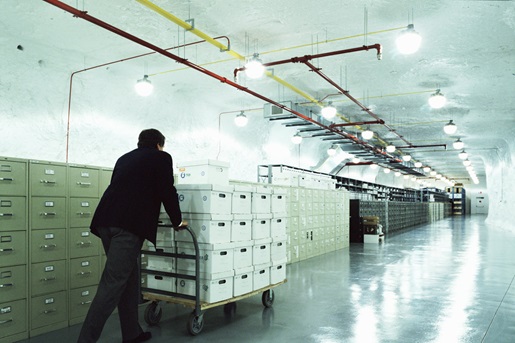Even digital-first businesses need secure document storage for essential paperwork.
While it may seem like every organization is going all-digital or moving onto the cloud, the reality is far more complicated. In practice, many businesses must maintain physical documents, such as financial records or tax paperwork, and regulations may require them to be stored on-site. For these companies, the priority is finding secure document storage options that protect files while ensuring the right parties have access.
The good news is businesses have several options when implementing and customizing their document management policies. Read on to learn what all decision-makers should watch for:
Read our free ultimate guide to learn how you can effectively implement the best document storage system for your business.
Why do businesses need secure document storage?
While digitizing every document and storing it in the cloud is ideal for efficiency, many regulatory bodies require a paper trail for auditing purposes. These regulations vary by nation and industry but often apply to purchase orders, contracts, and other essential parts of doing business. And that’s before we get into specialized cases such as property deeds that can only be authorized in a physical medium.
Businesses may be required to maintain essential records for at least three to seven years for tax purposes. Moreover, these documents may need to be retained even longer to fulfill insurance agreements. As businesses transition to digital workplaces, following these regulations can create logistical challenges throughout the process.
Did You Know?:PC Mag called the fi-8170 a “first-class product” that’s “ideal as a front end for high-powered document archiving applications,” even awarding the scanner a coveted Editor’s Choice award. Click here to learn more.
What are the most effective document storage strategies?
Keep documents in a single location
One of the easiest ways for a workplace to secure records is by storing everything in one place. It should be somewhere accessible, so anyone can find files as required. For large organizations, this space may need to be managed by a specific employee or group of employees. A dedicated location reduces the risk of losing or misplacing documents and is a helpful starting point when tracking down lost files, as it’s far easier to organize one storage space than a dozen.
Implement access control
Protecting sensitive records from unauthorized access is one of the most critical roles of secure document storage in physical and digital mediums. Therefore, ensuring that only specific individuals can access and read documents is essential. Keeping your storage area away from the general public is an excellent first step, but a policy for managing access is necessary to protect employees and intellectual property. This policy should include details such as whether documents must be signed out, how long they can be held off-site, and who is responsible for enforcing compliance.
Evaluate environmental risks
Sometimes the most pressing threat to documents isn’t a person but the surrounding environment. Floods, pests, and even unregulated humidity can destroy or irreparably damage records, and that’s before accounting for the fire hazards inherent to keeping big boxes of paper around. For these reasons, a risk assessment of storage areas is essential for identifying and reducing dangers. If an organization needs to maintain valuable documents for an extended time, it may need to invest in dehumidifiers and other storage options that support fixed environmental conditions.
Use digitization for backups
While businesses must maintain some physical documentation, that doesn’t rule out using digital tools. For example, some companies rely on digitization to create backups, archive older files, or reproduce records that have been damaged or lost. These files can be stored on on-premises servers managed by the organization or uploaded to the cloud.
Which processes and technologies make it easier to store documents?
Create a plan for document storage
The first step in securing any document should be adopting a document storage plan that everyone in the organization can follow. Document storage plans summarize the regulations, policies, and local procedures for handling documents, including how they will be physically stored and who has access to them. They can also include up-to-date risk assessments highlighting potential threats and hazards and recommendations for resolving them.
Find document storage containers
Where do you put all that paper? Prioritize document storage containers that balance neat and efficient storage with ease of access. While a filing cabinet is practical for recent files that need more frequent access, older documents may be better suited to large containers that maximize space efficiency. A range of storage options can address these needs, such as:
- Basic archival boxes that are relatively easy to store, retrieve, and browse.
- Heavy-duty containers that are robust and maximize storage space while limiting accessibility.
- Specialized containers for meeting unique professional requirements, such as blueprint holders.
Take advantage of document storage software
Document storage software can streamline many of the processes we’ve discussed by indexing and organizing files for future retrieval. For example, DigiTech Systems offers tools for tracking individual records, logging user access, and managing local and off-site storage. Simply taking advantage of a document storage database can help businesses spend less time organizing records and more time on immediate tasks.
Did You Know?:The fi-8170 can scan up to 70 pages per minute and 10,000 pages per day. Click here to learn more.
Streamline document storage with a high-speed scanner
Whether preparing a records index or simply backing up files, digitizing your documents is crucial to making any workplace more efficient in the 21st century. Thankfully, those in the market for high-speed document scanners have no shortage of options. We take great pride in having spent the last 50+ years researching, designing, and developing some of the most advanced and powerful electronics in the world, including our professional grade fi and SP Series scanners.
Built to purpose for the most demanding document handling jobs, fi and SP Series scanners are capable of processing tens-of-thousands of pages per day at the highest levels of accuracy. Their intuitive integration capabilities with all existing work suites minimize time-to-value for businesses looking to invest in tools that will pay dividends for years to come. Click here to learn more or shop the rest of our production scanner line.










